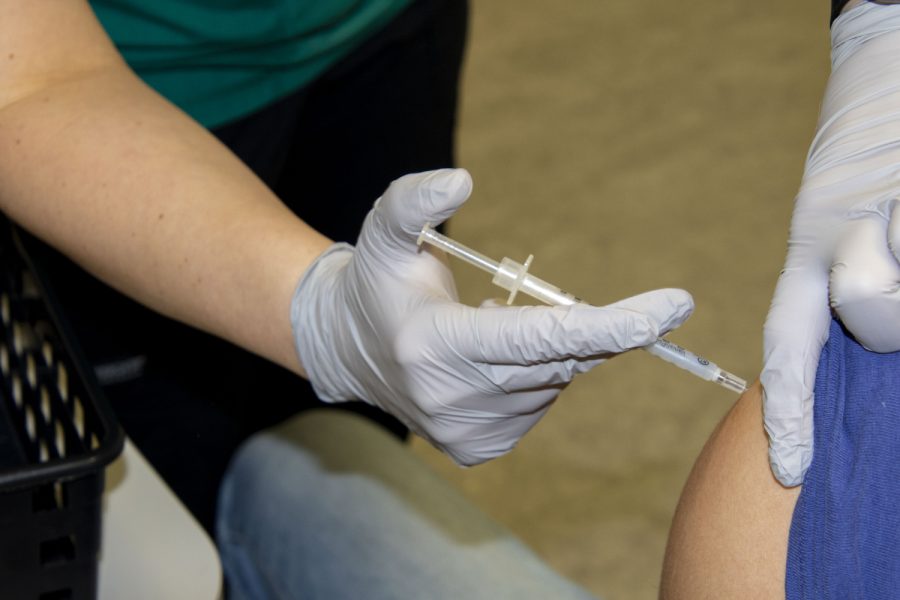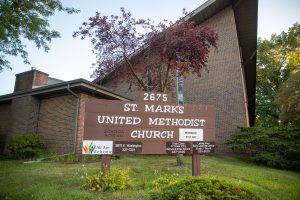UIHC participates in various COVID-19 vaccine trials
The University of Iowa’s Hospitals and Clinics are currently participating in three COVID-19 vaccine trials that are all at different stages.
A medical student receives their Moderna vaccine along with other University of Iowa students on Thursday, Jan. 28, 2021.
August 22, 2021
After over a year of participating in COVID-19 vaccination trials for various pharmaceutical companies, the University of Iowa Hospitals and Clinics is contributing to a vaccine booster study among other vaccine research to provide more knowledge and data.
UI Carver College of Medicine Executive Dean Patricia Winokur, who oversees vaccine trials at UIHC, said the university is very proud of its contribution to these “historic trials.”
“To be part of the knowledge base that has brought a trial and to begin within a year is due a moment of pride, I think, for all of us here at the University of Iowa,” she said. “On a more practical side, I think it was an opportunity for us to learn firsthand about how well these vaccines were tolerated and to understand how comprehensive the follow-up was.”
Winokur said this helps her and others involved in the trials mitigate concerns from the community about the vaccine since she saw the work first-hand.
UIHC has been involved with the Pfizer COVID-19 vaccine trials since summer 2020, when Cedar Rapids City Councilor Ashley Vanorny joined as a participant. Vanorny enrolled in the and received either a placebo shot or a shot with a booster dose on Aug. 6, 2021.
While she doesn’t know which she received, she said, she is currently in the same position as people who are not participating in the trial and is excited to see what happens next.
“I’m just waiting, like everybody else, at this point in time to see how the science comes out, to see what gets approved through the FDA,” she said. “And if I received the placebo, then I would get caught up with that third shot.”
RELATED: Local and state health officials urge Iowans to get vaccinated as Delta variant gains strength
Vanorny started as one of 270 participants in the Iowa City area. Winokur said 80 of the initial participants were selected for the booster shot trial. She said that trials should be wrapping up soon.
“The data is accumulating,” she said. “That tells us we need to consider boosters.”
The Food and Drug Administration approved booster doses for immunocompromised people on Aug. 13. Last week, federal health officials strongly recommended everyone get a booster shot eight months after their initial shots, and recent Centers for Disease Control and Prevention studies suggested vaccine effectiveness may wane over time.
The two-shot COVID-19 vaccine from Pfizer is currently looking to receive full approval from the FDA. Vanorny said she is staying vigilant as a participant in the trials, as guidance or information can change daily regarding the vaccines.
“Some of this can be confusing and frustrating,” she said. “Certainly as the science changes, as the circumstances change, so do the mitigation strategies … It’s really important for us not to get frustrated, to realize that the health care community is trying to get the best information out as soon as they have it, so that means information may change.”
As a participant, Vanorny keeps a digital diary on an app to log potential symptoms. She said the only difference between the initial trial and the booster shot one is that she had to re-login to the app to continue documenting her experience.
Alongside Pfizer, Winokur said UIHC is participating in trials for the Novavax vaccine, and recently put out a call for participants in a trial for Sanofi’s vaccine.
Since most people who want to be vaccinated already are, she said it is becoming difficult to find participants for new trials.
Winokur said the Novavax trials are in follow-up currently, and UIHC is pushing the company to begin a booster shot study.
The Sanofi trial is looking to use messenger RNA in a different way than other vaccines, she said. Both Pfizer and Moderna’s vaccines use messenger RNA.
“They are trying to get studies of a new messenger RNA platform, using COVID-19,” she said. “… I think these platforms are here to stay. They’ve been very successful.”
Winokur said she knows the Pfizer vaccine process did not skip any steps and wasn’t rushed — something she’s heard as an excuse for why people don’t want to get the vaccine.
However, Johnson County is the most vaccinated county in Iowa, which Winokur attributes to UIHC’s participation in various trials.
“I absolutely think that [the trials] has been one of the reasons our vaccination rates are higher in Johnson County than in some of the other counties,” she said. “I think our marketing and communications team has worked very hard to keep people updated and having that practical experience and being able to deliver that to the public has been very helpful.”






